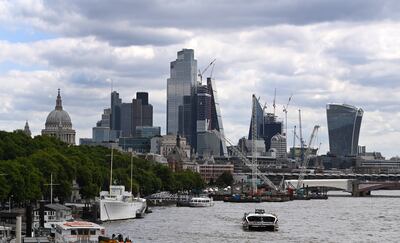The UK economy managed a tiny amount of growth in the first quarter, again avoiding the spectre of recession.
Gross domestic product grew by 0.1 per cent over the quarter, according to the Office for National Statistics.
Economic growth fell by 0.3 per cent in March, following the 0.5 per cent growth in January and zero growth in February.
“The fall in March was driven by widespread decreases across the services sector,” ONS statistician Darren Morgan said.
“Despite the launch of new number plates, car sales were low by historic standards — continuing the trend seen since the start of the pandemic — with warehousing, distribution and retail also having a poor month,” he added.
The ONS said that the British economy was still 0.5 per cent smaller compared with the pre-pandemic level in the final quarter of 2019.
“It's good news that the economy is growing, but to reach the government's growth priority we need to stay focused on competitive taxes, labour supply and productivity,” said Chancellor of the Exchequer Jeremy Hunt.
The Bank of England forecast on Thursday that the economy would grow by 0.25 per cent this year and narrowly avoid a recession. Previously the central bank had predicted a 0.5 per cent contraction in 2023.
"A weaker economy in March underscores its fragility despite a fall in wholesale energy prices, improving supply chain conditions, and consumer confidence that has also recovered from multi-year lows," KPMG economist Yael Selfin said.
"While recession is probably no longer on the cards, vulnerabilities resulting from higher borrowing costs and tighter credit are likely to dampen business and household activity this year."

Facing uncertainty
UK economic growth in the first quarter was also hampered by widespread industrial action, while British households continue to face double-digit inflation and relatively high interest rates.
"A shrinking economy in March is to be expected considering the multiple challenges hitting output, from stubbornly high inflation and rapidly rising borrowing costs to falling real incomes and perpetual strike action," said Alice Haine, personal finance analyst at Bestinvest.
"Falling output is worrying news for household finances as it signals the economy is not faring particularly well with businesses and consumers constraining expenditure in the face of so much uncertainty ― something that can lead to pay freezes and lost jobs."
On balance, economists see the first-quarter figures as broadly positive, but warn that the UK economy is by no means on a solid path to recovery, and as such will be vulnerable to external shocks for some time.
“The UK economy is proving more resilient than widely expected and it looks increasingly likely that the UK will avoid a recession this year," said Ben Jones, lead economist at the British Confederation of Industry (CBI).
"Underlying momentum appears to be firming, with our surveys showing growth expectations for the quarter ahead creeping back into positive territory for the first time in a year.
“Nonetheless, this is still going to be a difficult year for many UK households and businesses.
"While we anticipate that inflation will slow rapidly through the summer, higher interest rates will act as a drag on spending. But we are likely to have weathered the worst of the storm, and expect a mild economic recovery in the year ahead,” he added.


